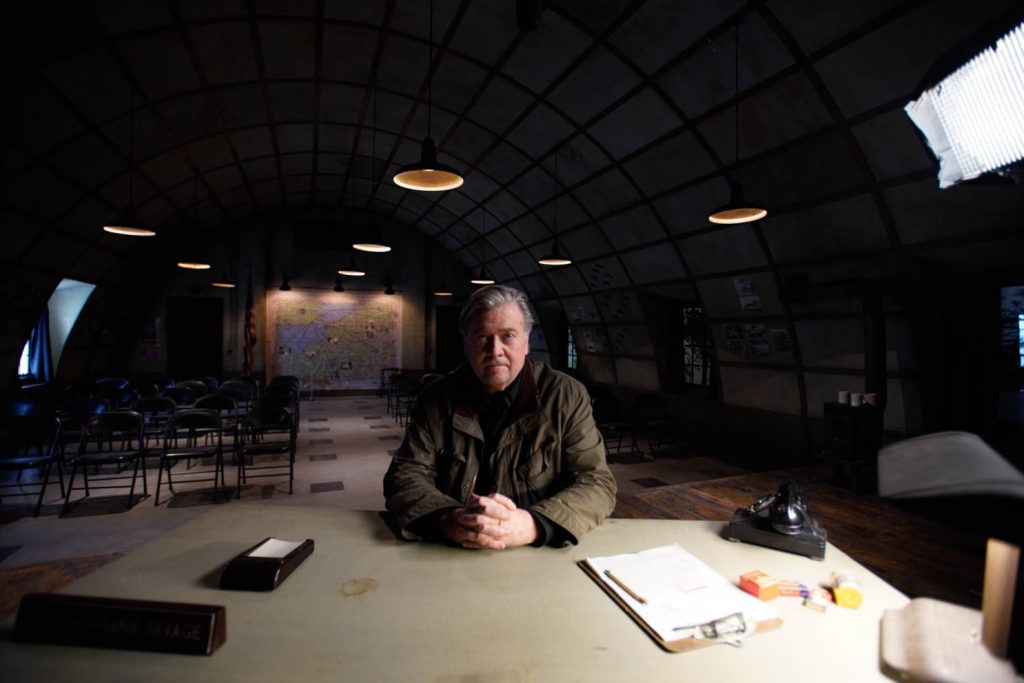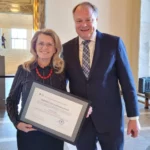Blog Post
Misunderstanding Steve Bannon
This is my latest column for The European Conservative
By Jonathon Van Maren
It has been nearly three years since Steve Bannon was pushed (or jumped) out of the Trump Administration. Since then, he has become something of a genre. In 2018, the documentary filmmaker Errol Morris (The Thin Blue Line, The Fog of War) released American Dharma, a film-length journey through Bannon’s mind. In 2019, filmmaker Alison Klayman released The Brink, a fly-on-the-wall look at Bannon’s attempt to cobble together a coalition of right-wing populists around the world to spearhead a global nationalist movement. And earlier this year, Harper Collins published Benjamin R. Teitelbaum’s War for Eternity: Inside Bannon’s Far-Right Circle of Global Power Brokers.

Unlike other ‘Bannon-watchers’—many of who seem unable to resist casting him as a Rasputin-like figure, while being simultaneously repulsed and fascinated by his insistence on speaking in symbolic and often apocalyptic terms—Teitelbaum approaches his subject from an unlikely angle. An assistant professor of ethnomusicology and international affairs at the University of Colorado Boulder, Teitelbaum has spent years developing relationships with those on the far right. His 2017 book, Lions of the North: Sounds of the New Nordic Radical Nationalism, focused on the right-wing fringe in the Nordic countries. In War for Eternity, he suggests that some of Steve Bannon’s views might be a lot weirder than most people realize. Specifically, Teitelbaum believes Bannon is a student of ‘Traditionalism.’
Traditionalism, says Teitelbaum, is the common ground among a motley crew of self-described philosophers, far-right eccentrics, and political operatives from around the world. Hailing from Russia, Hungary, Brazil, and the United States, to name just a few, they are linked in their attempt to usher in a ‘new global order.’ And their beliefs, Teitelbaum posits, help to explain why.
“We casually use the words ‘traditionalism’ and ‘traditionalist’ to describe someone who is skeptical of change, finds comfort in continuity, maybe more specifically someone who sees a lost sense of structure, order, and meaning in the past,” Teitelbaum told me in a recent interview. “Capital-t ‘Traditionalism’ pushes all that into hyper-drive and infuses it with a bizarre brand of apocalyptic spirituality.”
He went on to explain that “Traditionalism is an arcane underground philosophical and religious school that emerged in early 20th century Europe and that, throughout much of its existence, hasn’t had a lot to do with politics. It is focused on the airy mission of discovering truths about the universe, which it believes are contained in select religious faiths, Sufi Islam and Hinduism in particular, but also pre-monotheistic Indo-European religions and sometimes branches of Christianity.”
Most political figures have never heard of Traditionalism, which is an extraordinarily fringe patchwork of beliefs. According to Teitelbaum, the eccentricities of this worldview—which purportedly originated with Islamic convert and French occultist René Guénon and Italian philosopher Julius Evola—include “beliefs that the past was virtuous because communities were more rigidly delineated from one another.” However, he then adds, “the signature difference from small-t traditionalism in my mind is Traditionalism’s belief in cyclic time—the notion that society is destined to degrade from a ‘golden age’ toward a ‘dark age’, after which cataclysmic events return society back to its golden age, and the cycle of decline and rebirth continues, on and on.”

In short, Traditionalists pine for long-gone ancient civilizations possessed by rich spirituality and structured by strict hierarchies (which appear to exist primarily in their own fertile imaginations). They also long for the demise of corrupt modernity and look forward to a return to a new golden age. But this, as Traditionalists will readily admit, may require a massive amount of destruction in the present.
Based on 20 hours of conversations with Bannon, Teitelbaum is certain that the former Breitbart CEO and political guru is a subscriber to Traditionalism. When I asked him if Bannon’s familiarity with Traditionalist philosophy (if this jumble of myth and mystical cherry-picking can be referred to so charitably) could simply be a result of his famously eclectic reading habits and his penchant for presenting lofty narratives, Teitelbaum insisted that Bannon is an adherent. He cited two reasons for this: First, Teitelbaum explained, “[Bannon] strives to present his actions as being in accordance with the values of Traditionalism, and this leads him to explicitly identify—with qualification—as a Traditionalist.” The second reason is that “he has attempted to convene and collaborate with others inspired by Traditionalism—and that is hardly something he or most people do with all the authors and intellectuals.”
It is the identity of those with whom Bannon has chosen to collaborate—or at least associate—that makes Teitelbaum’s account particularly interesting. He recounts, for example, Bannon’s eight-hour meeting with Russian philosopher, propagandist, and political operative Aleksandr Dugin. “There are those who think Dugin is a secret agent,” Teitelbaum told me, “and [that] he has functioned as a diplomat of sorts, […] operating with unclear mandates but occasionally finding himself mediating in consequential and volatile political situations: the Chechen War, Russian/Turkish conflicts in Syria, etc.” Dugin’s books, says Teitelbaum, “especially Foundations of Geopolitics, were taught to a generation of Russian military leaders in the late 1990s and early 2000s, and relayed—in dry, pragmatic language—his vision for [a] world inspired by Traditionalism.”
Bannon attempted to convince Dugin that American and Russian interests should be aligned against Communist China. According to Teitelbaum, he used some aspects of Traditionalism to challenge Dugin’s characterization of America as ‘the bad guy’ in global affairs. But “Dugin finds a more virtuous and traditional past contained in Russian and Eurasian society, and decadent, materialistic modernism bent on homogenizing the world emanating from the West in general—and the United States in particular,” Teitelbaum said.
Although he has never held an official position in the Kremlin, Dugin “has had the ear of various figures in the government who have amplified and allied with his vision.” He has also worked “to strengthen Russian ties with Turkey, China, and Iran—and [has been] been hosted in state, state-media, or state educational institutions in each place.” In the end, according to Teitelbaum, Bannon’s meeting with Dugin was fruitless—and Dugin continues to see America as whatever a Traditionalist’s version of ‘the Great Satan’ is.
According to Teitelbaum, Bannon is also close to Olavo de Carvalho, a Brazilian journalist, philosopher, political pundit, and former astrologer, now living in the U.S. in Virginia. Carvalho is considered to be an extraordinarily important figure in Brazilian president Jair Bolsonaro’s inner circle, and many believe him to be the driving force behind much of Bolsonaro’s ideology. Both Bannon and Carvalho believe that “Brazil belongs in alliance with Western Christian nations rather than China,” and Carvalho’s influence is at least partially credited with Bolsonaro’s diplomatic pivot to the United States. De Carvalho’s own involvement in Traditionalist circles stretches back decades and is well-known.
The real-world influence of these obscure ideas, of course, is difficult to discern. “To an extent, […] Traditionalism overlaps with [the] populist political agendas that Dugin, Bannon, and Carvalho have participated in: contempt for academic, media, and political establishments; isolationist foreign policies; rejection of free trade and open borders; yearning for upheaval, in addition to standard social conservatism,” Teitelbaum told me. “All of those instincts receive a spiritual mandate in Traditionalism but need not be announced as such in public. In my work, I have tried to gain a greater understanding of what drove, say, Bannon’s feverish hostility toward China and insistence on the fortification of borders, and in many instances, the answer was some reading of Traditionalism. Its influence, in sum, has to do with having motivated powerful figures who—bizarrely, at roughly the same time and as part of the same global political movement—found themselves in positions of influence.”
The extent of Bannon’s current influence is also an open question. His endorsement of scandal-plagued Roy Moore in Alabama—who then lost a previously safe U.S. Senate seat to a Democrat—damaged Bannon’s political credibility in the U.S. In Europe, his track record has been unimpressive, and nationalist politicians from France to Italy have dismissed his continental forays as having no significant political consequences. Is it possible, I asked Teitelbaum, that Bannon’s connections come due to his presumed connections to the Trump Administration rather than his centrality to some global network of right-wing power brokers? “This is an exceptionally complicated topic,” Teitelbaum replied, “and one that I have found arouses strangely heated positions.”
He explained that there is a “spectrum of interpretations.” On one side, he said, there are those who see Bannon as “an overblown, washed-up nobody”; on the other side, people see him as “the puppet master.” Teitelbaum then added that his own impression is “that the truth does not lie in between those poles but is instead comprised of both extremes at once. That Bannon has had major failures in recent years is no doubt, especially in Europe, and his ability to maintain media focus on his actions is driven by an insatiable desire for attention and a refined method to get it. At the same time, however, he has major channels into sectors of Brazil’s government, the orbit of people consulting with him in Washington, D.C. is—I can confirm—massive, and his public outreach on China and the coronavirus has been relatively successful and prophetic.”
“It is along those lines that the past weeks have seen claims in the New York Post that [Bannon’s] influence in the White House is growing—and an editorial from the Spectator recommending he be revived as Trump’s campaign manager.”

Some of Teitelbaum’s conclusions seem overstated. Throughout War for Eternity, he is obviously quite taken with Bannon, frequently noting his intelligence and his charisma. In fact, Teitelbaum’s recounting of their conversations portrays a man not always familiar with many of the tenets of the Traditionalism to which Teitelbaum refers, and one gets the sense that Teitelbaum is frequently filling in the gaps from his own encyclopedic knowledge of fringe philosophies to give Bannon’s statements coherence where it is lacking.
While Bannon is certainly a firebrand political operative with a knack for eye-catching framing devices, Teitelbaum’s arguments that Traditionalism makes up Bannon’s animating philosophy are unconvincing. Nearly all of the distinctive characteristics of a Traditionalist would also be common to a run-of-the-mill social conservative (at least from a political perspective) and could just as easily derive from Bannon’s Catholicism as from his readings of Traditionalism. (As a side note, several of Bannon’s friends assure me that his Catholicism is genuine.)
On the other hand, it is certainly fascinating to read that key advisors to at least three major world leaders—Bolsonaro, Putin, Trump—have all dabbled in this bizarre philosophy. Teitelbaum has pulled off an impressive journalistic feat in detailing those connections.
Perhaps what is most refreshing about Teitelbaum’s work is that he is willing to enlighten where others are ready to condemn. “Studies of right-wing extremism are uncommon in the extent to which they thrive on conforming to readers’ stereotypes and expectations,” Teitelbaum told me. “The prevalent discourse among scholars and commentators to not normalize or platform the people we study, though motivated by legitimate concerns, also leaves little room for inquiry and education. I would like for all my work—including this book—to work against that instinct.”
In the case of War for Eternity, he says: “I offer a study that not only exposes thoroughly radical and disruptive visions for the future being pursued by figures with significant (if intangible) influence—[but] I hope that I have also shown the peculiarity of their lives and thinking, and provided an example of the ways that our old categories for thinking about politics—right, left, fascist, etc.—may not serve us well when trying to understand the actual ideas now infusing our governments. If concern and alarm as well as increased inquiry and reflection are the products of my book, I will have done my job.” By those metrics, Teitelbaum has certainly succeeded.








